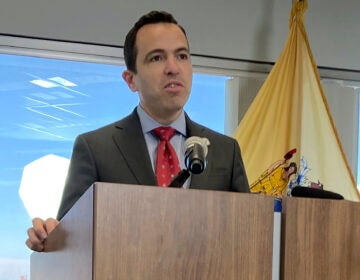New Jersey may require extra steps before utilities can shut off power
A new bill would require electric companies to inquire if customers suffer a health impairment before power was cut off.

(J. Scott Applewhite/AP Photo, file)
A bill awaiting action in the New Jersey Legislature would require electric companies to request information from residential customers about whether any person living there would suffer a serious impairment to their health or safety it the power was cut off.
State Sen. Gerald Cardinale introduced the legislation in response to the death of a 68-year-old Newark woman in July. She relied on an electric-powered oxygen tank and PSE&G shut off her electric service because of an overdue bill.
“If this is your family member, this is your mother, this is your sister, who died because the utility company just turned off the juice because you didn’t have the money, it boggles my mind,” he said.
Cardinale also wants customers with serious health problems to have to provide proof if they cannot pay their electric bill.
“They would have to deliver a written statement from a medical professional on a semi-annual basis. And they would have to specify the nature of the medical condition. You run into HIPAA regulations there so there has to be some degree of flexibility,” he said.
Cardinale said he’s getting support for the measure from several other lawmakers and is hopeful it will be enacted.
“It’s a shame that somebody had to die for this issue to rise to where legislators started to pay attention including me. That’s something we should have thought of before somebody died. But it has shown us how important it is,” he said.
WHYY is your source for fact-based, in-depth journalism and information. As a nonprofit organization, we rely on financial support from readers like you. Please give today.




